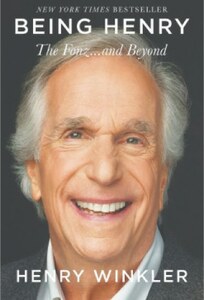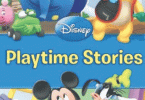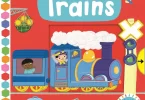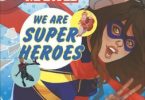Being Henry: The Fonz… and Beyond
By Henry Winkler, with James Kaplan
MacMillan
ISBN: 978-1250-8880-99
256pp.
Happy Days, MacGyver and Barry — at first nothing seems to be in common between the three TV shows from different eras, but … Henry Winkler is a common factor in all of them. He was the guy who played the main lead in the first, executive produced the 1980’s runaway hit that was the second, and appeared as a cast member in the third.
He might have become highly successful from his first TV role in Happy Days — where he played Arthur Herbert Fonzarelli, also known as ‘Fonzie’ or ‘The Fonz’ — but Henry Winkler explains in this memoir that the journey to success wasn’t easy for him.
Being Henry: The Fonz… and Beyond unveils the struggle of a youngster whose Jewish parents were unsupportive, who had trouble reading all his life because of dyslexia, and who poured his heart out into acting so that he wouldn’t have to join his father’s business.
The 78-year-old doesn’t just talk to his readers in the usual carefree style of his Happy Days character, he also explains to them why his feet haven’t left the ground, despite portraying what many consider one of the most memorable characters on TV. Like all famous actors, he shares his accomplishments with the readers, but he also gives them an insight into his insecurities, which have been part and parcel of his 50-plus years in showbiz.
Actor, producer, director, author and voice-over artist Henry Winkler’s memoir is most poignant when he deals with the curse of stardom
Unlike other memoirs, this one has few chapters, and a lesser number of pages, but there’s enough content to keep you hooked. The first half talks about Henry’s struggle to become an actor, whereas the second half is about his struggle to stay relevant. How he managed to succeed in both, is what makes this book unputdownable. The reflections from his wife Stacey also add another perspective, which adds colour to this delightful conversation.
Although he doesn’t address the fact directly, the cold behaviour of Henry’s parents might have had something to do with what they went through during the Nazi holocaust in Germany and their escape from it. They lost many dear ones, some of whom were supposed to follow them to the States. Throughout this book, Henry keeps labelling his parents as unloving and detached but, once he became famous, they started owning him, and even shared his (private) telephone number with people they knew.
If you didn’t know that Henry Winkler was a graduate from Yale University’s drama school, and began his career on stage before making a memorable guest appearance on The Mary Tyler Moore Show, or that he was already a film actor when he became part of Happy Days, then don’t worry.
One gets to know a lot of new facts about him after going through these pages. For example, he writes about how he was unceremoniously fired as a director from Tom Hanks’ Turner & Hooch, why he shared a hostile relationship with his MacGyver co-producer John Rich and how, within the first 42 seconds of meeting the late Robin Williams in Happy Days, he knew that he was in the presence of greatness.
Not only does he talk about the good stuff that happened during the series, but also about his promotion from a supporting character to the main character, which irked his castmates. He also expresses his views on the transition from being considered too old for the character of Fonzie, to a time when the producers contemplated adding his character’s name to the show’s title, which thankfully didn’t materialise.
However, he reveals that the network’s attitude made his fellow actor Ron Howard so mad that he became a film director and ended up winning multiple Academy Awards for A Beautiful Mind. How Henry was a part of that fateful decision is something you will have to read to believe.

Despite being an actor whose first major TV role made him a superstar, and who played main leads in movies where the supporting cast included future superstars Harrison Ford, Sylvester Stallone and Michael Keaton, Henry Winkler didn’t have smooth sailing in Hollywood. He explains that, because of The Fonz’s popularity, he either got typecast or didn’t get a call for a long time, which steered him towards direction, production and eventually writing books for children.
He also discloses why he chose to write children’s books with Lin Oliver, and how it helped him share his experience as a lifelong dyslexic. The response to his book series, The Adventures of Hank Zipzer, has made him popular among the youth, especially dyslexic ones. So, if you didn’t know him as The Fonz, you might know him as the guy who created the young boy with dyslexia, who overcomes learning challenges every day.
The other ‘disease’ the author deals with here is the ‘lifelong effects of stardom’, which, according to the person playing Fonzie, is one of the reasons why he wants to keep on doing different work, so that people recognise him as something other than the Happy Days guy. He is also thankful to his wife and his kids for being there for him, otherwise he wouldn’t have been able to return to acting, which he did repeatedly, with success.
As the title of this book suggests, Henry goes beyond his Fonz days and explains how he got to become a part of the MacGyver-inspired Royal Pains, what made him say yes to Arrested Development, how much he enjoyed working in Parks and Recreation, and finally about his most recent work Barry, the HBO series that helped him win his first Primetime Emmy.
The writing style here is witty and truthful; the author doesn’t bash anyone unless it is needed. Moments like owning the ‘jumping the shark’ terminology to his ‘struggle’ to direct Burt Reynolds in Cop and a Half are part of this narrative, as is the role of Adam Sandler in the resurrection of Henry’s film career, through movies such as The Waterboy (yes, he was in it!).
The picture gallery in Being Henry: The Fonz… and Beyond adds a nostalgic touch to the narrative and makes you wish there were more images available of Henry Winkler, both on and off the screen. However, I couldn’t find any picture of MacGyver in the ones available here, which is sad, considering the series steered Henry’s career in the right direction, and kept it alive after the conclusion of Happy Days.
Why is Henry known as the nicest guy in the business? Why is he always supporting newcomers despite being much older to them? And why doesn’t he believe that he is famous? Henry Winkler addresses these questions as well in this memoir. The way he talks about the curse of stardom can be informative for up-and-coming actors, who believe that getting that one gig that could take them to the top would be enough to succeed. Henry did just that, and struggled afterward.
“To stay in New York and be seen by a few, or head to California and be seen by the world.” This was the choice Henry had when he began his career and, thankfully, he made the right choice. He is now a popular actor, director, producer, author and voice-over artist. He has been part of the showbiz industry since the 1970s and, through this book, you will get to know his accomplishments and disappointments.
Be ready to be surprised to know the other side of Henry Winkler… Aaaayyy!
The reviewer is a broadcast journalist who also writes on sports, film, television and popular culture. X: @omair78







